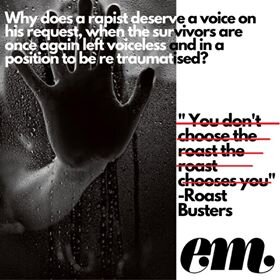Roast Buster ringleader re traumatising victims in order to clear his reputation and start a music career
An ethical issue that caused public debate last year within the media is the NewsHub interview (Rutherford, 2019) with former Roast Buster ringleader, Joseph Parker. The interview broke a five- year silence since the horrific events of sexual assaults that took place in 2013. The public debate arose due to the interview potentially bringing up trauma for the female victims that were affected by the Roast Busters. Another concern that caused controversy with the public is the lack of remorse that Parker showed for the victims and his insensitivity when he released his song “Trophies” with lyrics alluding to his Roast Busting days. Some claim that this interview was Parkers’ effort to clear his reputation of being a rapist and sexual predator and to gain publicity to help launch his music career.
The Roast Busters scandal initially broke media coverage in 2013. The Roast Busters was a group of West Auckland teenage boys who group raped and videoed the raping of several underage and often drunk victims. The boys posted the videos onto their Facebook page and would name and shame the girls they raped. The groups catchphrase was “you don’t choose the roast, the roast chooses you”. Complaints about the group had been made by victims in 2011 to the New Zealand police but no action was taken until 2013, resulting in an eighteen-month investigation. However, the police said there was not enough evidence for the boys to be sentenced and video evidence of the boys carrying out the assaults would not hold in court. The case is famous for the lack of action that was taken by police, with the boys getting off free with no charges. On the 16th of November 2013 citizens protested nationwide to draw more attention to rape prevention and speak up against victim blaming and highlight the rape culture in New Zealand. (Kenny, 2013). The scandal was unresolved with the police failing the victims, the two main group members Joseph Parker and Beraiah Hales went into hiding receiving no justice or punishment for their crimes. On the 9th December 2019, Joseph Parker posted a video on his personal YouTube channel, under the name of ‘Høhëpa’ a video titled “From Roast buster to giving my life to Jesus Christ (Testimony)”. The video has been viewed 2,250 times and depicts Parker talking about his new faith, his past with the Roast Busters and his new life in L.A. (Parker, 2018). A couple of days before the NewsHub interview was broadcasted on television Parker posted a video on Patreon, which is an online subscription-based website that allows artists to upload their music. He asked for money and donations to support his music career. This has been seen as a motive for Parker speaking out after five years of silence.
Journalist Karen Rutherford broke coverage on the story of the Roast Busters in 2013 when the scandal was brought to public and media attention. On January 21st 2019 Parker was again interviewed by Rutherford. This was promoted as leading headline news on Newshub live at 6, with a two-part interview, one screening on Monday night and the second part showing on Tuesday night in prime time. The ethical issue that is in question is why did NewsHub frame the interview in favour of Parker? Journalist, Rutherford kept a close relationship with some of the victims and with Parker. Rutherford and NewsHub dramatized and largely promoted the story. Rutherford went on the AM show the morning the interview with Parker was going to be aired. The host of the AM show said, “exclusive interview, don’t miss the news tonight”. The ethics of promoting the interview can be questioned as to whether Rutherford wanted justice for the victims or for more rating viewers. Making the story a major headline in the news can be seen exploiting a real-life event which happened to these girls and turning it into entertainment for the viewers. The host mentioned “Do not miss it” and “They are the ones to watch”. Another questionable approach that can be seen in the promotion of this interview is another reporter reading out an old victim statement on air. The statement recalls one of the girl's experiences with the Roast Busters. The ethical issues that arise from this are bringing back past trauma, for the victims, there hasn’t been media coverage of the event since 2013. Rutherford mentions on the AM Show that they have not been able to get into contact with all the victims to let them know of the interview airing.
Between 2011-2013 when the assaults took place Joseph Parker and Beraiah Hales used the status and attention gained from their Roast Busters page to feed their egos. They gained attention from their peers by demeaning and disempowering women while bragging about their sexual conquests. The popularity and attention they received from there online videos encouraged them to keep seeking out victims. According to (Rutherford, 2019). Joseph Parker reached out to the news source wanting the interview to take place. The issue is why Parker was allowed a voice and more public attention? By giving Parker a two-part interview in the main news story he gained the publicity that he wanted for his music career and he was also allowed to speak out on his own terms. The victims back in 2013 were publicly humiliated on social media sites like Facebook and Ask FM. Vulnerable young girls, some as young as thirteen were humiliated in a public domain. To this day only five out of the seven known victims have come forward to police with the other two remaining silent. According to HELP “Only about 10 out of 100 sexual abuse crimes are reported and 3 of those get to court. Sadly, only one of those is likely to get a conviction.” Parker is yet given again another platform which puts him in a position of power over his victims and allows him a voice. During the interview (Rutherford,2019) Parker states “ I am not here to get their forgiveness”, talking about the victims, he says “God has already forgiven me”. News Hub could have focussed on the victim's response instead or could have contacted victims of similar sexual assault cases where they were comfortable bringing awareness to the sexual assault problem New Zealand faces. News Hub could have also contacted organizations like HELP for women who have gone through similar experiences. They could have promoted and shown sexual assault in a different and more helpful way rather than allowing screen time for someone who has assaulted young women and rather than apologizing, talks more about his own fame and upcoming music career. NewsHub chose to let Parker share his story even though he committed horrible and unlawful acts. The media has the power to give people platforms to worldwide exposure and can give criminals the fame that they desire. A recent example of this is where the Prime Minister Jacinda Ardern earlier this year publicly declared to the media that she would not use the name of the Christchurch terrorist, acknowledging the power the media has over making criminals infamous and setting an example for us all (Wahlquist,2019).
Newshub aired the interview in light of the public, disregarding the detrimental effects that may be implemented on the victims who were affected by the assaults from Parker. Newshub was aware of the consequences and trauma that the victims could face by watching the interview, not thinking of everyone's happiness despite the topic and situation being very sensitive and personal to the victims. In a ‘Spinoff’ website interview, (Casey, 2019), one of the victims sat down with the investigative website and told her story under the alias name of “Laura”. Laura describes the night she became a victim, her feelings towards the Roast Busters and her reaction to Joseph’s Parkers interview. “The story isn’t about can we get justice, or how can we prevent this happening again, it’s still about them. Just like the last round of stories and the stories before that.” In the interview, Laura’s mother states “He knows he’s done wrong and he got away with it, and now he gets to go on TV and re traumatize everyone again. Laura clearly has been impacted in a negative way by this interview airing, this raises concern if the interview did serve the interest for the greater good. The injustice of the situation is summed up by Laura when she states, “He gets to go on the news to promote his new song, I get a 20% off voucher for counselling sessions.”
The fact is that the victim had to hide her identity and her story was publicised on a minor website with minimal viewers while Parker the male perpetrator receives maximum public attention.
Allowing Parker to have a voice on a public platform has consequently caused widespread public contention and controversy. Overall the interview allowed Joseph Parker to gain attention while upsetting his past victims.
Written by Alesha Arrowsmith











